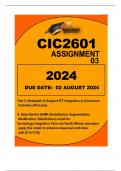, CIC2601 ASSIGNMENT 03 DUE DATE 02 AUGUST 2024
Part 1: Understanding ICT Integration in South African Schools (40 marks)
1. Define ICT (Information and Communication Technologies) and explain why its integration is
crucial in the context of South African education. [10]
Information and Communication Technologies (ICTs) refer to the technologies used to manage, process,
and communicate information (UNESCO, 2003). ICT integration in South African education is crucial for
several reasons.
Firstly, ICTs enhance teaching and learning experiences. They provide access to a vast array of
educational resources, enable interactive learning, and facilitate collaboration among students and
teachers (Kennewell et al., 2001).
Secondly, ICTs bridge the digital divide and promote equity in education. By integrating ICTs, schools can
provide equal access to information and opportunities for all students, regardless of their socio-
economic background, 2002).
Thirdly, ICTs prepare students for the digital age. They develop essential skills, such as computer literacy,
critical thinking, and problem-solving, necessary for success in the 21st century (Wagner, 2008).
Lastly, ICTs improve education management and administration. They enable efficient data collection,
analysis, and reporting, supporting informed decision-making (UNESCO, 2003).
In conclusion, ICT integration is vital in South African education to enhance teaching and learning,
promote equity, prepare students for the digital age, and improve education management.
Reference
Kennewell, S., Parkinson, J., & Tanner, H. (2001). Learning to Teach ICT in the Secondary School.
Routledge.
UNESCO (2003). ICT in Education. Retrieved from
Wagner, C. (2008). Learning in the Digital Age. Routledge.
2. Identify and elaborate on three significant challenges faced by South African schools when
integrating ICTs into their educational framework. Provide specific examples if available. [15]
Integrating Information and Communication Technologies (ICTs) into South African schools faces several
challenges. Three significant challenges are:
- Infrastructure: Many schools, especially in rural areas, lack the necessary infrastructure to support ICT
integration. This includes lack of access to electricity, telecommunication infrastructure, and adequate
storage facilities (Cawthera, 2001; Herselman, 2003; Kante & Savani, 2003).




